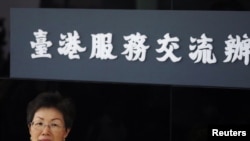Taiwan opened a government office this month to help Hong Kong citizens apply for residency as China passed a security law that worries people in the former British colony who have protested over the past year against Beijing's rule. Taiwan would offer a democratic haven free of any prosecution.
Though it’s hard to gauge interest so far — Taiwan opened its Hong Kong Service Office just six days ago — analysts watching interaction between the two sides expect just a modest number of Hong Kong people to try relocating.
China took control of Hong Kong in 1997. Taiwan is self-ruled despite Beijing’s claim that it falls under Chinese rule.
Most Hong Kongers with an eye on emigration prefer the salaries of the West over those of Taiwan and some worry that Taiwan will eventually erupt in conflict with China, the analysts say.
“Taiwan to them is like Hong Kong in the future,” said Shane Lee, a retired political science professor from Chang Jung Christian University in Taiwan. “They’re very leery about the future of Taiwan [if] maybe there was a war or something.”
Taiwan will garner some interest among the fearful in Hong Kong because of its proximity, 90 minutes away by air, lower costs of living and a Chinese culture similar to Hong Kong’s.
Business people with personal connections in Taiwan particularly thrive here because of the lower operating costs, said Yee Ming Tan, an executive coaching service operator who made the move 10 years ago. Those connections help newcomers navigate Taiwan’s business regulations, Yee said.
Taiwan’s Investment Commission lists 1,760 investment projects from Hong Kong since it began keeping records in 1962 and they’re worth a combined $7.9 billion.
Wealthier people fleeing Hong Kong are more likely to land in Western countries than in Taiwan, said Liu Yih-jiun, public affairs professor at Fo Guang University in Taiwan. The ones leaving in 1997 headed for Australia, Canada and other Western countries. Costs of living run higher in the West, as do salaries.
Working-class Hong Kong people would face lower pay in Taiwan, compared to Hong Kong, plus a job market with little space for newcomers without connections and who speak only Hong Kong’s Cantonese rather than the official Mandarin Chinese of Taiwan, analysts warn.
Monthly net salaries in Hong Kong are more than twice those of Taiwan, according to the Numbeo database.
“The only language they can communicate with people is Cantonese,” Liu said. “And then this society — friendly but not that friendly. If the overseas workers want to compete [for] a job, these people will be heavily discriminated.”
Hong Kong retirees would consider Taiwan for its cost of living, but people who need money will bypass it, said Alex Chiang, associate professor of international politics at National Chengchi University in Taipei.
“The cost of living is low, but I think the pay is not comparable to a lot of Hong Kong,” Chiang said. “I think they’ll go to some place where they can make more money.”
Australia, Britain and the United States have also proposed ways to accept Hong Kong citizens as refugees in light of China’s new law.
China approved the Hong Kong security law June 30 to quell the sometimes violent protests that shook Hong Kong over the past year. The law criminalizes secession, subversion, terrorism and collusion with foreign forces.
Taiwan’s service office offers Hong Kong dwellers humanitarian assistance, help finding work and tips on investing or setting up a business.
The Mainland Affairs Council, a government agency in charge of China policy, did not respond Monday to a request for data on numbers of people served or expected. Media outlets say the office got 180 inquiries on its first day.
Last year pro-democracy activists in Hong Kong had asked Taiwanese legislators to consider an asylum law. Mindful of its own security, Taiwan still handles asylum seekers from Hong Kong and mainland China case by case. China has not renounced the use of force against Taiwan, if needed, to make the two sides unify.
Taiwan still hopes to avoid any “social burden” by limiting Hong Kong people's applications for residency, Lee said.
Slightly more than 5,000 people from Hong Kong received Taiwan residence permits last year, up 40% over 2018, the government-backed Central News Agency in Taipei reported.




